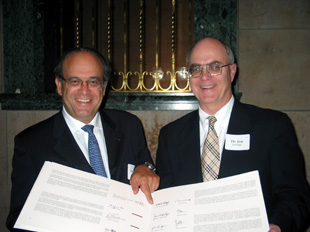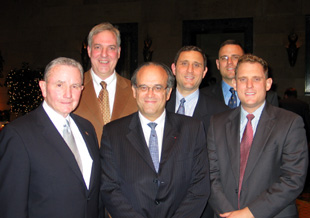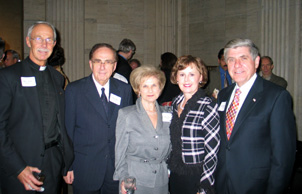 |
David Khayat, M.D., Ph.D., left, delivered the Carol Bell Lecture this year. He also brought with him the Charter Against Cancer, a book containing the signatures of more than 200 heads of state and leaders in cancer research. James Armitage, M.D., professor in the UNMC Internal Medicine Department/Section of Oncology/Hematology, was one of the original signers of the charter. |
“It can be an empty chair at the table, an empty room in the house,” said David Khayat, M.D., Ph.D., president of the National Institute of Cancer in France and the speaker for the 2004 Carol Bell Lectureship. “Cancer causes pain to families.”
Dr. Khayat talked about the battle against cancer at the Carol Bell Lectureship dinner on Nov. 4 at the Joslyn Art Museum. In 2000, he was the person who organized the Charter of Paris Against Cancer, a unique effort to bring world and medical leaders together in the fight against cancer.
The charter was formed under the auspices of M. Jacques Chirac, president of France, and initiated at the World Summit Against Cancer in Paris. The charter was originally signed by 100 leading officials representing government, patient advocacy, cancer research organizations, and corporations throughout the world.
James Armitage, M.D., a professor and oncologist in the UNMC Internal Medicine Department, was one of the 100 original signers of the charter. Dr. Armitage was invited to sign the charter, as he is considered one of the leading oncologists in the country in treating people with lymphoma.
|
2.Eradicate the stigma of cancer. 3.Promote knowledge and scientific progress. 4.Ensure the right quality cancer care. 5.Enhance cancer prevention 6.Prioritize screening and early detection. 7.Empower cancer patients. 8.Improve quality of life. 9.Support local strategies. 10.Establish alliances. |
Before a crowd of more than 100 people including Nebraska Sen. Ben Nelson, Dr. Khayat detailed the 10 principles behind the Charter of Paris Against Cancer. He talked about the stigma that accompanies anybody who has cancer and the exclusion and discrimination faced by people with cancer.
One group that is especially vulnerable to cancer is the poor. “If you’re poor, it’s difficult to even get care for cancer,” Dr. Khayat said.
Fortunately, great strides are being made in the battle against cancer, said Ken Cowan, M.D., Ph.D., director of the UNMC Eppley Cancer Center. In the United States, Dr. Cowan said President Nixon declared war against cancer in 1971. Since that time, major advances have occurred, including:
- There are now 10 million cancer survivors, three times as many as there were in 1971.
- Breast cancer survival has increased 20 percent in the past 10 years.
- Prostate cancer survival has increased by almost 25 percent in the past 10 years.
 |
The Carol Bell Lectureship celebrated its fifth anniversary this year. Celebrating the event were (left-right): Bob Bell, vice president for business and community development for UNeMed and the person who established the lectureship in honor of his late wife; Ken Cowan, M.D., Ph.D., director of the UNMC Eppley Cancer Center; David Khayat, M.D., Ph.D., president of the National Institute of Cancer in France and the 2004 Carol Bell lecturer; and three of Bell’s sons — Brian Murphy; Doug Murphy; and Jeff Murphy. |
Dr. Cowan recognized Lance Armstrong as the “premier example” of cancer survivorship. “Twenty years ago, his testicular cancer would have been a fatal disease,” Dr. Cowan said. “Now, he’s won six consecutive Tours de France.”
Dr. Cowan said the UNMC Eppley Cancer Center has achieved several recent milestones. These include:
- Getting its designation as a clinical cancer center renewed by the National Cancer Institute (NCI);
- Being one of only 61 NCI-designated clinical cancer centers in the country and the only such center in the five-state area between North Dakota and Texas;
- Bringing in more than $45 million in cancer research funding annually;
- Hiring 40 new faculty members.
He said the UNMC Eppley Cancer Center’s ultimate goal is to become a comprehensive cancer center.
 |
Among the guests at the Carol Bell Lectureship dinner at the Joslyn Art Museum were (left-right): the Rev. John P. Schlegel, S.J., president of Creighton University; Harold M. Maurer, M.D., UNMC chancellor; Beverly Maurer; Diane Nelson; and U.S. Sen. Ben Nelson. |